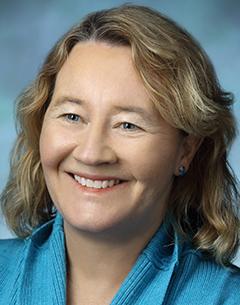
Carol Greider
Daniel Nathans Professor and Director of Molecular Biology and Genetics, Johns Hopkins University
Charles M. and Martha Hitchcock Lectures
March 4, 2014 — 4:10 PMInternational House, Chevron Auditorium — 2299 Piedmont Avenue, UC Berkeley Campus
About the Lecture Telomeres are the chromosomes end-part, that are needed to protect chromosome ends. Due to the way chromosomes are copied, these telomeres shorten with each round of cell division. This shortening is kept in check by the enzyme … Continued
International House, Chevron Auditorium - 2299 Piedmont Avenue, UC Berkeley Campus Berkeley Graduate Lectures [email protected] false MM/DD/YYYYAbout the Lecture
Telomeres are the chromosomes end-part, that are needed to protect chromosome ends. Due to the way chromosomes are copied, these telomeres shorten with each round of cell division. This shortening is kept in check by the enzyme telomerase which elongates telomeres. However because of the limited amount of telomerase, telomere shorten with age in humans. People who cannot effectively elongate telomeres may show manifestations of a Telomere Syndrome, which include age-related diseases such as bone marrow failure, immune senescence and pulmonary fibrosis. We will discuss how the seemingly benign structure on chromosome ends can underlie human disease.
About Carol Greider
Carol Greider is internationally renowned for her important contributions to the field of molecular biology. She was awarded the 2009 Nobel Prize for Physiology of Medicine along with Elizabeth Blackburn and Jack W. Szostak for their discovery that genetic sequences known as telomeres are protected from progressive shortening by the enzyme telomerase. Greider discovered telomerase in 1984 while working with Elizabeth Blackburn at the University of California, Berkeley. Telomeres are essential to chromosome maintenance and stability. In the absence of telomerase, telomeres shorten progressively as cells divide, eventually leading to cell death or cellular senescence. Greider’s breakthrough discovery of the telomerase enzyme thus allowed a mechanistic understanding of cellular reproduction, opening new avenues of research into cancer, and age-related disease.